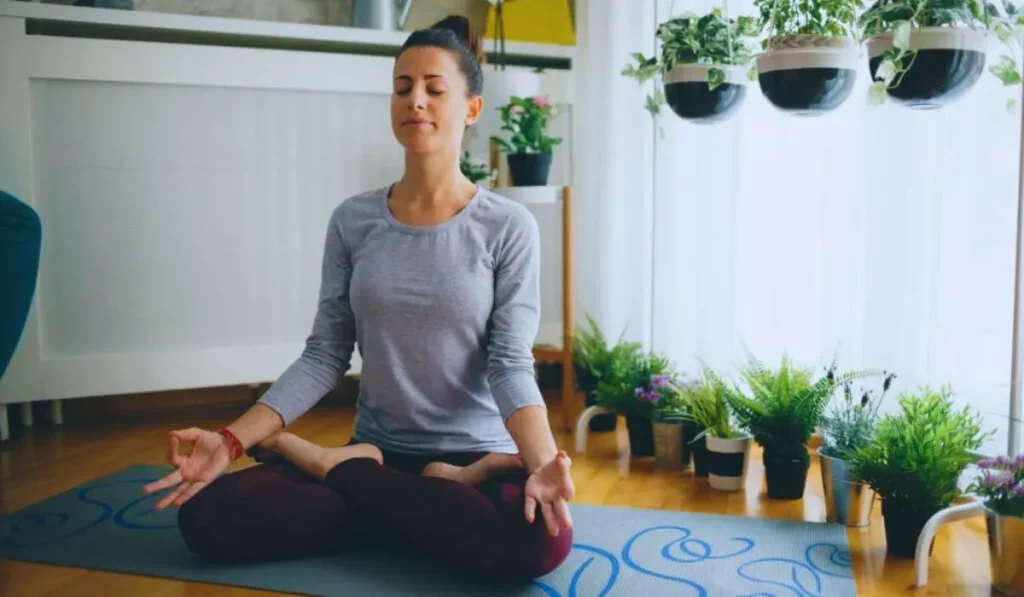Yoga is a well-liked activity that has been discovered to be successful in lowering stress and fostering awareness. Stress management has become more vital in today’s fast-paced environment.
An overview of yoga’s potential as a method for stress relief and mindfulness will be given in this article. It will go over the meaning and effects of stress, the relationship between yoga and reducing stress, the value of mindfulness in reducing stress, particular yoga poses for reducing stress, the role of breath control and meditation, useful advice for incorporating yoga into daily life, and success stories from real people.
Understanding Stress

Stress is a common reaction to environmental pressures or demands, particularly if viewed as harmful or hazardous. It results from hormones, brain chemicals released in response to stimuli.
Small amounts of stress help people meet deadlines, prepare for presentations, be productive, and arrive on time for crucial events. Stress is a normal component of daily living. Long-term stress, however, has the potential to be damaging and raises the likelihood of both physical and mental health issues.
Stress can manifest as cognitive (thinking-related), emotional, physical, or behavioral signs and symptoms. They might be mild to severe in severity. Physical surroundings, interpersonal interactions, employment, daily events, and significant life changes are common sources of stress.
These circumstances can include distressing occurrences like monetary issues, relationship breakdowns, challenges at work or school, accidents, illnesses, or even death and grief. Positive alterations, including job promotions, marriage, or parenthood, can also result in stressful conditions.
Chronic or persistent stress that lasts for a long time raises the risk of hypertension, heart attacks, and strokes and interferes with the male reproductive system’s normal biochemical activity. It can also cause long-term issues with the heart and blood vessels.
It has the potential to lead to disease due to alterations in the body or unhealthy coping mechanisms like smoking, overeating, and other undesirable habits. Mental health issues like anxiety, depression, psychosis, and post-traumatic stress disorder (PTSD) can be brought on by ongoing stress.
Relationship Between Yoga And Stress Reduction
It has been discovered that yoga is a powerful tool for lowering stress. It encourages relaxation, is the natural antidote to stress, and is good for the body, the mind, and breathing.
Yoga has physiological effects that include lowering blood pressure, increasing heart rate variability, and reducing levels of stress chemicals in the body. Regarding psychology, yoga can elevate mood, foster a sense of well-being, and lessen depressive and anxious symptoms.
Mindfulness In Yoga
It is known as mindful yoga, incorporating mindfulness exercises into its physical practice. Being present at the moment, without distraction or judgment, is the practice of mindfulness.
Focusing on the breath and body in the present moment while developing self-awareness and compassion through non-judgment, patience, beginners’ minds, trust, non-striving, letting go, and gratitude are all parts of mindfulness practice in the context of yoga.

Individuals who practice mindful yoga may find that it increases their awareness of their thoughts, feelings, and bodily sensations and their ability to cope with stress and anxiety.
People can learn to reframe difficult events and feel less reactive to them by engaging in mindfulness exercises in yoga. Yoga that focuses on awareness can be practiced before meditation, leading to mindfulness in daily life.
Yoga Asanas And Poses For Stress Reduction
Some yoga asanas and poses are very useful for lowering stress levels. These include, among others, the Cat-Cow Pose, Savasana, and Child’s Pose.
Each posture has a specific right technique and advantages, such as easing neck, shoulders, and back tension.
Mindfulness And Breath Control
Pranayama, or the control of the breath, is a key component of yoga’s stress-reduction techniques. It can assist people in controlling their respiration and calming down their nervous system. Yoga practices that incorporate meditation techniques can help people become more attentive and fully present in the moment.
Add Yoga In Your Routine
Including yoga in your routine can be a useful method to increase awareness and reduce stress. To see results, it’s crucial to start small and maintain consistency. Finding a quiet area to practice, designating a fixed time each day, and beginning with beginner-level postures are some advice for bringing yoga into daily life.
Conclusion
Yoga is an effective method for lowering stress and promoting mindfulness. It is acknowledged as a type of mind-body medicine that unites a person’s physical, mental, and spiritual components to enhance various aspects of health, especially ailments brought on by stress. Yoga is effective in treating mood-related problems like stress, anxiety, and depression in numerous studies.
Given that yoga has been demonstrated to increase a person’s sense of well-being and enhance the overall quality of life, yoga should be considered as an alternative or complementary therapy for medical therapy in treating stress, anxiety, depression, and other mood disorders.

